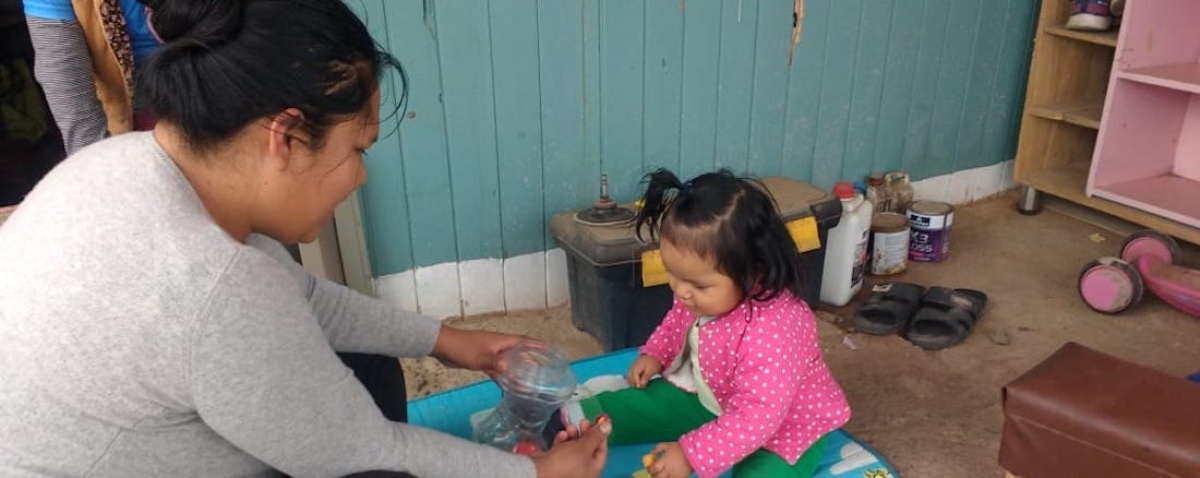In Peru, PIH Offers Virtual Sessions on Child Development Amid COVID-19
Partners In Health offers free sessions for caregivers and young children in Peru, teaching foundational skills through play.
Posted on Sep 2, 2020

In a sunlit room, a mother shows her daughter a small pink bead, holding it up in one hand and grasping a plastic jar full of beads in the other. The blue and green mat beneath them is sprinkled with pieces of all colors and shapes. Her daughter, a toddler, had been playing with a dandelion yellow bead, but is now fascinated with the pink bead, eyes wide as she watches her mother bring it closer and closer to the mouth of the jar.
This space isn’t a daycare; it’s the home of Rocío Salas and her daughter, Valentina, in Lomas de Carabayllo, a community in Peru’s Northern Lima District. They are practicing skills learned through The CASITA Project.
Valentina is one of thousands of children enrolled in The CASITA Project, a child development program run by Socios En Salud, as Partners In Health is known in Peru. Amid COVID-19, the program has shifted to online sessions. But its mission remains as crucial as ever: equipping caregivers with critical knowledge and skills as they nurture the next generation.
Virtual Learning
The idea driving CASITA is nuanced yet simple—invest in caregivers and, by doing so, help the children in their care reach their fullest potential.
CASITA identifies children ages 6 to 24 months who are at risk of developmental delay, and then trains caregivers in activities that encourage age-appropriate behavior. The program offers 12 free sessions led by community health workers, where caregivers and children learn skills through play, using toys and household items such as bottletops and bedsheets. An important part of the sessions is the practice of “serve and return” interactions between both. This back and forth process is important to the wiring of the brain in the earliest years.
The program began in 2013 as a pilot and has served more than 3,000 children in the communities of Northern Lima, Peru, where poverty and systemic barriers contribute to high levels of malnutrition, chronic illness and domestic violence. CASITA has produced positive results—85 percent of the children in the pilot program showed marked improvement.
When Salas enrolled Valentina in CASITA in January, Salas was reluctant at first. She and her husband hadn’t had access to education about child development due to structural barriers. But as Valentina learned more skills and grew more confident, Salas came to realize just how crucial the first few years of life—and her role as a caregiver—really are.
“At the beginning, my husband thought that it was not important to sing, congratulate or show affection,” says Salas. “But I made him understand that all this is good to strengthen Valentina's confidence and that we must think about her future.”
When the family began CASITA, the classes were hosted at a local health center. As COVID-19 began to spread, the program went virtual to protect the health of staff, caregivers and children.
These days, the Salas family accesses the classes via mobile phone. They watch videos, learn and apply child development concepts, and send photos and videos of their activities with Valentina to the CASITA team, so health professionals can evaluate their progress and provide feedback.
Like other families in the program, they also have access to Chatbot, a mobile app developed by Socios En Salud. The app asks a set of basic questions about a child’s developmental milestones, collect a health children information and connects caregivers with resources related to child development and socio-economic support.
A Community Effort
For CASITA, a program typically hosted in health centers or the homes of community members, the transition to digital hasn’t been seamless.
Caregivers in Peru, as in other countries, must juggle an ever-growing list of responsibilities during the pandemic—a list that, for many, includes work, school and other family obligations that demand their attention.
Technology, too, has complicated the effort. Some caregivers didn’t have access to a smartphone or the kind of data package needed to share media files and access the Chatbot app. But that hasn’t stopped caregivers.
“They are so motivated to participate and learn new topics that will help their children develop properly, that they borrow the cell phone of their husband or a relative to receive the information,” says Nancy Rumaldo, CASITA project coordinator.
And community health workers—in many ways, the program’s foundation—have played a vital role in helping with the transition to digital.
“At this time when we cannot meet, it is important to continue communicating to know how the family is, what they need and if they have any questions,” says Franklin Ruiz, a community health worker with the CASITA team.
Ruiz, a primary school teacher living in Carabayllo, joined CASITA three years ago. He’d seen the program’s impact firsthand when his mother hosted sessions for caregivers and children in her home. Now, he draws on the knowledge and skills he has learned to educate caregivers in his community.
The shift to digital hasn’t been easy, but it has been necessary. Even as a global pandemic puts much of life on hold, children continue to learn, grow and develop, making caregiving just as vital now as ever before.
“CASITA virtual is about providing that accompaniment,” says Ruiz. “It’s telling caregivers 'you can' and 'you are not alone.’”

